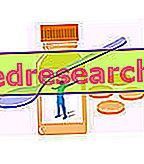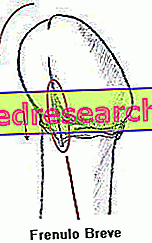Definition
Reactive hypoglycemia is a particular hypoglycemic form, not dependent on an insulin overdose, a condition - the latter - typical of diabetic patients treated with injectable insulin or oral hypoglycemic agents.
Also called food or postprandial hypoglycemia, reactive hypoglycemia essentially depends on prolonged fasting or excessive sport, and occurs after a couple of hours from the end of the meal.
Causes
In most affected patients, reactive hypoglycemia is the result of prolonged fasting, poor nutrition and lack of sugar or excessive sport. Reactive hypoglycemia is sometimes related to congenital enzyme deficiencies (eg fructose intolerance, galactosemia), hormonal alterations (eg hypothyroidism), excessive adrenaline sensitivity, poor glucagon production, prediabetes, gastrectomy.
Symptoms
The symptoms associated with reactive hypoglycemia are somewhat vague: anxiety, asthenia, increased heart rate, confusion, weakness, intense hunger, hyper-sweating, headache, drowsiness, lightheadedness, fainting, tremor.
Information on Reactive Hypoglycemia - Reactive Hypoglycemia Drugs is not intended to replace the direct relationship between health professional and patient. Always consult your doctor and / or specialist before taking Reactive Hypoglycemia - Reactive Hypoglycaemia Drugs.
drugs
Before resorting to drugs to treat reactive hypoglycemia, it is necessary to intervene on the diet, by correcting both the way in which we eat and the choice of food.
Below, some of the most important guidelines are summarized to avoid the emergence of reactive hypoglycemia:
- Split meals into snacks during the day, avoiding spending more than 3 hours from snack to snack
- Avoid taking sugary foods on an empty stomach
- Limit your intake of simple sugars
- Prefer complex sugars
- Prefer fruit and vegetables
- Do not drink alcohol on an empty stomach
- Prefer whole-grain and fiber-rich foods that can slow intestinal glucose uptake
In addition to these simple dietary rules, it is recommended to always combine regular exercise, which - in patients with reactive hypoglycemia - must be moderate, never excessive; do not perform fasting physical activity.
Often, reactive hypoglycemia requires the administration of pectin, psyllium and guar gum supplements; sometimes, the administration of drugs - such as acarbose and glucose - may be necessary. Unlike hypoglycemia due to an incorrect administration of insulin in diabetic patients, the reactive form, rather than being treated with drugs, must be prevented by simple dietary and behavioral rules.
It must be remembered, however, that reactive hypoglycemia could be associated with type II diabetes mellitus (in the early onset phase): in this case, adrenergic symptoms (uncontrolled release of adrenaline, increased sympathetic activity, weakness, palpitations, extreme hunger, etc.) tends to arise 4-5 hours after the end of the meal: insulin resistance causes a post-prandial temporary hyperglycemia to occur after a meal, followed by a massive secretion of insulin; hyperinsulinemia causes an important reactive hypoglycemia to occur in the second phase, after 4-5 hours of fasting. In this case, the intake of glucose and carbohydrates with a medium glycemic index is recommended; glucagon should only be administered in the event of severe reactive hypoglycemia, if the oral administration of glucose is not sufficient to reverse the symptoms.
- Acarbose (eg Glicobase, Glucobay): the drug is an alpha-glucosidase inhibitor used to treat type II diabetes mellitus and to treat reactive hypoglycemia. The acarbose dose must be customized based on the severity of the condition, the glycemic response and the general state of health of the patient. The drug exercises its therapeutic activity both by delaying the absorption of glucose and by reducing the stimulus to the synthesis of insulin.
- Glucose (eg Gluc33% GSE, Gluc50% MNC, Gluphos): in general, in the first hypoglycemic stage and in severe reactive hypoglycemia, it is recommended to take sugar, in the form of lumps or granules (10-20 grams, equivalent to 3 lumps). The next meal should be rich in medium and low glycemic index carbohydrates, to prevent a further hypoglycemic compensatory episode from excessive insulin secretion. Alternatively, the administration of intravenous glucose (at a dose of 25 ml - 50% glucose solution - or 50 ml - 20% glucose solution -) is indicated to treat severe hypoglycemic crises (in general, the latter indication is suitable almost exclusively to treat hypoglycemia dependent on an insulin overdose in diabetics).
Note: in obese patients with postprandial reactive hypoglycemia due to insulin overproduction, it is essential to follow a low calorie diet, reducing the amount of carbohydrates.



